Social Media Manager Jobs require posting, but hiring qualified managers demands careful screening. Between numerous resumes, trendy job titles, and “I grew my dog’s Instagram to 10K” applicants, finding social media managers who grow businesses requires thorough evaluation.
This guide shows how to hire social media managers who deliver business results. You’ll discover necessary skills, job posting creation techniques, and whether freelance social media managers, agencies, or full-time hires suit your business needs. We’ll also share where the best social media professionals spend time, from LinkedIn and Instagram to TikTok and other platforms.
From scheduling tools like RecurPost and Buffer to salary ranges and onboarding templates, this guide provides resources to hire social media managers who align with your brand voice, target audience, and marketing goals.
Why Social Media Manager Jobs Matter for Every Business
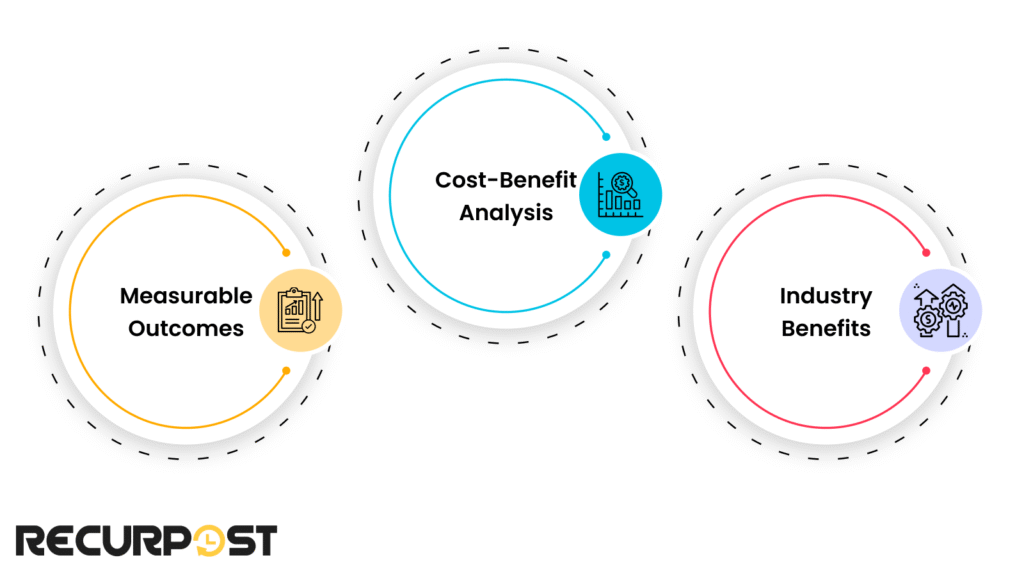
Measurable Outcomes of Hiring Social Media Managers
Filling Social Media Manager positions drives real results for small businesses, startups, and agencies. Skilled social media managers lift follower growth and raise engagement. They speed customer acquisition and generate a rise in site traffic. Many small businesses and agencies have seen significant improvements after hiring a social media manager.
Cost-Benefit Analysis of Hiring a Social Media Manager
A full-time hire for social media manager jobs costs $50K–$70K annually, but the return often beats DIY efforts. For hiring managers, this cost-benefit breakdown of social media hires builds budget confidence.
Industry Benefits of Social Media Manager Careers
B2B teams generate LinkedIn leads and thought leadership. B2C brands build Instagram communities and TikTok viral content. Agencies enhance services through social media specialists, content strategists, or community managers. Social media manager roles address platform-specific needs.
Core Responsibilities in Social Media Manager Jobs
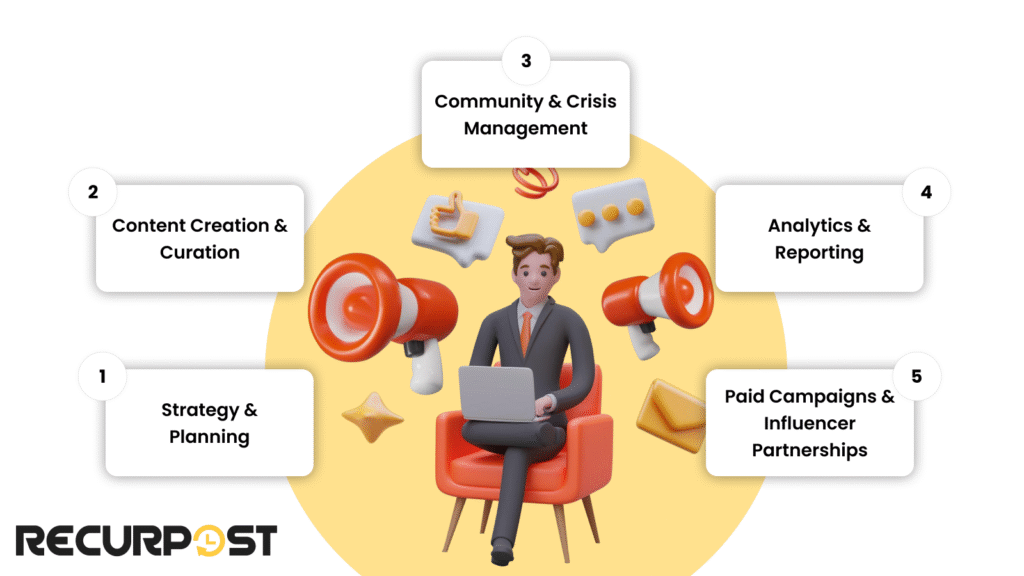
1. Strategy & Planning for Social Media Manager Jobs
Social media professionals create content calendars across LinkedIn, Instagram, TikTok, and Facebook groups. They establish goals aligned with business objectives and select platforms that maximize brand visibility for target audiences.
2. Content Creation & Curation Duties of Social Media Managers
They create posts, stories, and reels using Canva or Adobe Suite. They repurpose high-performing content to extend reach across channels. They utilize scheduling tools like Buffer, Hootsuite, or RecurPost to publish 30+ monthly updates.
3. Community Management & Crisis Response
They handle community engagement through prompt responses to comments and DMs. They monitor social media trends, maintain a consistent brand voice, and apply crisis management techniques to safeguard reputation.
4. Analytics Tracking & Reporting
They use analytics tools like Sprout Social and Google Analytics to measure engagement rate improvement, conversions, and traffic. They refine social media strategies and deliver clear reports to prove ROI.
5. Paid Advertising & Influencer Partnerships
Social media managers execute Facebook Ads and LinkedIn Sponsored Content campaigns to reach target audiences. They select influencers aligned with brand values and track ROI through established performance metrics, adjusting budgets for optimal growth.
Understanding these core social media manager responsibilities helps businesses define the role clearly and hire the right person to drive their online growth.
Key Skills for Social Media Manager Jobs
The best Social Media Manager candidates combine creativity, data analysis skills, and cultural fit. Hiring managers should look for:
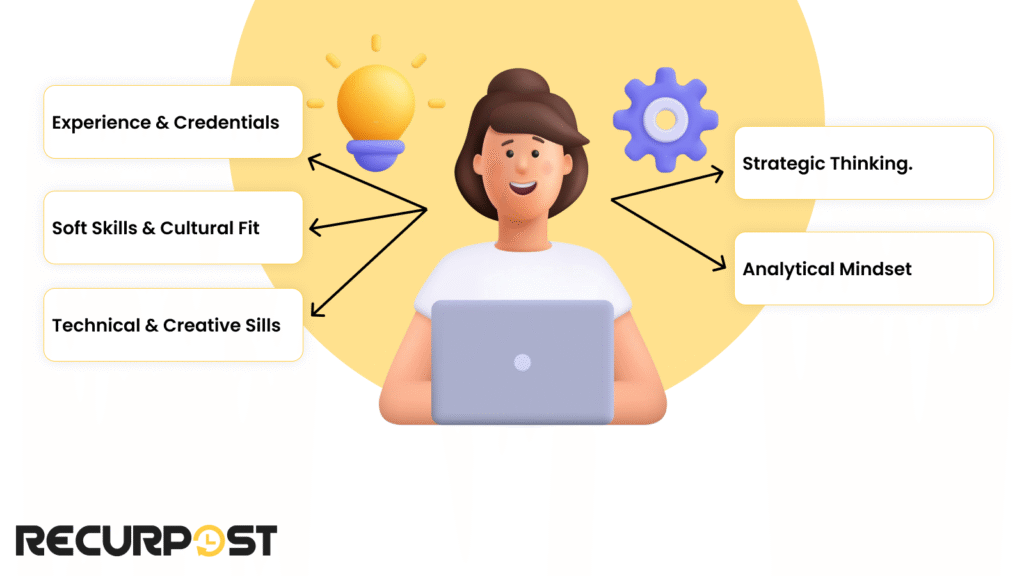
1. Technical & Creative Skills in Social Media Management
Proficiency with LinkedIn, Instagram, and TikTok platforms is essential for social media managers. Content creation skills across posts, stories, and reels show versatility. Analytics tools expertise ensures accurate performance reporting.
2. Analytical Skills & Metrics
Social media managers establish metrics aligned with business goals, compare paid and organic results, and use data to refine strategies and improve outcomes.
3. Soft Skills & Cultural Fit for Hiring Social Media Managers
Social media managers maintain a consistent brand voice, collaborate with teams (in-house or freelance), and adapt quickly to evolving trends across channels.
4. Experience & Credentials in Social Media Careers
Candidates need experience in social media management or specialist roles with proven results. Portfolios showing content creation, follower growth, and successful account management are vital. Certifications or experience as digital marketing coordinators, brand managers, or content managers strengthen candidacy.
5. Evaluation & Hiring Red Flags
Paid trials verify candidate skills for social media manager positions. Avoid applicants without portfolios, measurable results, or analytics proficiency. Reject candidates with weak community management skills or limited social media expertise.
These qualities help identify candidates who can achieve business goals and improve brand visibility.
Crisis Management Abilities in Social Media Manager Jobs
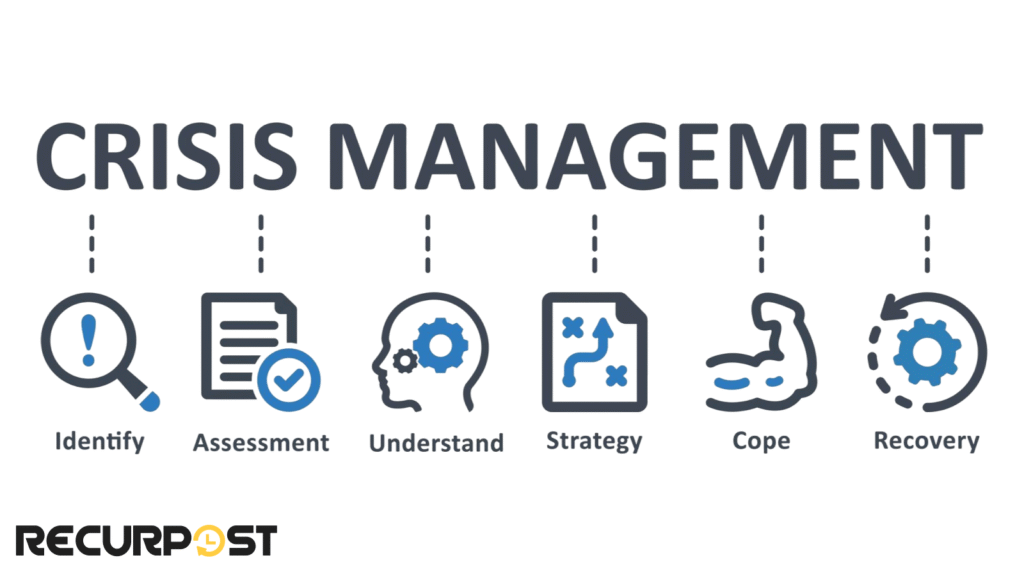
When challenges hit, professionals in Social Media Manager Jobs must use crisis management abilities to protect the brand’s reputation. This checklist tests candidates’ crisis management skills:
1. Scenario-Based Crisis Questions
Ask how candidates would respond to a critical tweet from a top customer or handle failed advertising campaigns on Instagram or TikTok. Look for acknowledgment, investigation, and appropriate public and private follow-up.
Sample questions include: “Walk me through your response if our latest product launch receives harsh criticism on LinkedIn”, and “How would you handle a situation where an influencer partnership goes wrong publicly?”
2. Crisis Protocol & Workflow Review
Request their crisis response document, flowchart, or crisis management procedures. Verify they understand escalation paths to legal, PR, or leadership. Check their experience with scheduling tools like RecurPost’s inbox to monitor mentions across social media channels.
3. Speed, Tone & Brand Voice Maintenance
Evaluate response time for urgent issues (under one hour). Review sample replies for empathy, clarity, and brand voice consistency. Assess the balance between transparency and confidentiality for sensitive issues.
4. Past Crisis Experience & Reference Checking
Discuss past crisis management on Facebook groups, LinkedIn, or other platforms. Verify engagement recovery and sentiment resolution. Contact references about crisis performance, decision-making, and account protection capabilities.
This assessment helps select candidates who protect accounts and maintain trust during crises.
Interview Questions for Social Media Manager Jobs
Effective interview questions reveal whether candidates can handle real social media challenges. Test skills across planning, creativity, and crisis response with these categories:
1. Planning & Analytics Questions
Ask “How would you develop a 90-day content calendar for our target audience?” to test planning abilities.
Follow with “Which social media platforms would you prioritize for a B2B software company and why?” to gauge platform knowledge.
Test their analytics proficiency with “Walk me through how you’d measure ROI for a LinkedIn campaign.“
2. Content Creation & Creativity Assessment
Request portfolio samples during the interview: “Show me your best-performing post and explain why it worked.”
Test adaptability with “How would you repurpose this blog post for Instagram, TikTok, and LinkedIn?“
Gauge brand voice maintenance by asking, “How do you maintain consistency across multiple social media channels?“
3. Crisis Management & Communication Skills
Present real scenarios: “A customer complains about poor service in our Facebook comments. How do you respond?“
Test escalation knowledge with “When would you involve legal or PR teams in a social media crisis?“
Measure response speed expectations: “What’s your target response time for negative comments?“
4. Technical Skills & Tool Proficiency
Ask about scheduling tools: “Compare your experience with Buffer, Hootsuite, and RecurPost.”
Test analytics knowledge: “Which metrics would you track to measure engagement success?“
Gauge paid advertising management: “How do you optimize underperforming Facebook ads?“
5. Cultural Fit & Team Collaboration
Test company culture alignment: “How do you adapt your communication style for different team members?“
Ask about remote work capabilities: “How do you stay productive when managing multiple social media accounts remotely?“
Measure growth mindset: “Tell me about a time you learned a new social media trend and applied it successfully.”
6. Red Flag Questions to Avoid Weak Candidates
Watch for vague answers about follower growth without metrics. Avoid candidates who can’t explain their content creation process or lack crisis management experience. Skip applicants unfamiliar with analytics tools or unable to provide portfolio samples with measurable results.
These interview questions help hiring managers select social media professionals who can drive engagement, manage crises, and align with business objectives across all social media platforms.
Remote vs. In-Office Social Media Manager Jobs

Choosing between remote and on-site social media managers affects collaboration, productivity, and culture. Consider these factors:
1. Communication & Collaboration
Remote managers use Slack, Zoom, and RecurPost’s inbox with daily check-ins. In-office managers benefit from impromptu conversations and brainstorming. Cross-team collaboration improves content creation and project flow.
2. Productivity & Focus
Remote roles provide flexibility and access to global talent. Track performance with Google Analytics, Sprout Social, or other analytics tools. In-office positions keep work close to design and marketing teams for faster feedback and asset requests.
3. Company Culture & Fit
Remote candidates require autonomy, reliable internet, and structured schedules. Thorough onboarding aids remote adaptation. On-site positions accelerate culture integration through team proximity.
4. Time Zones & Availability
Remote managers need a minimum 4-hour overlap. Shared calendars and response protocols aid crisis management. In-office managers respond faster due to time zone alignment. Both require coverage plans for holidays and off-hours.
5. Legal & Cost Factors
Remote hiring needs clear policies, stipends, and compliance with local labor rules. Contractors or freelancers can reduce benefit costs. In-office roles include costs for space, hardware, payroll, and benefits. These positions require full compliance with labor law.
Step-by-Step Hiring Process for Social Media Manager Jobs
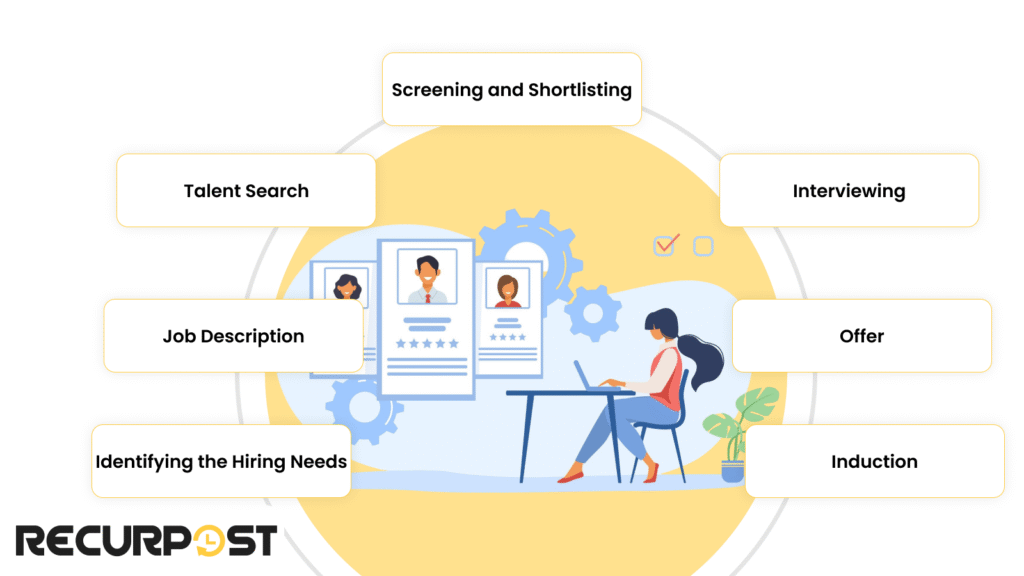
1. Pre-Hiring Preparation
Define business objectives and the target audience before hiring. Select platforms and tools like Buffer, Hootsuite, or RecurPost. Budget using salary benchmarks ($35,000–$85,000) and cost-benefit analysis. Create an SEO-friendly job posting to attract qualified candidates.
2. Sourcing & Candidate Screening
Post positions on job boards, LinkedIn, and targeted Facebook groups. Recruit on Instagram and TikTok to reach active social media professionals. Screen candidates by checking engagement metrics, analytics proficiency, and portfolios of past accounts.
3. Skill Assessment & Evaluation
Assign a paid trial: 2-hour campaign plan for one platform. This tests strategic thinking and creativity. Assess content creation skills, analytics knowledge, and strategy innovation.
4. Interview Process & Reference Checking
Ask about handling engagement drops and negative comments during interviews. Include scenarios such as “How would you address an underperforming paid campaign?” Check references to verify results, decision-making, and cultural fit.
5. Offer, Salary Negotiation & Onboarding Procedures
Make a competitive offer quickly. Allow for salary negotiation to secure the best candidate. Share brand guidelines, grant tool access, and set 90-day KPIs. Effective onboarding ensures a smooth start. Integrate them into the team workflow and schedule check-ins for performance tracking and support.
Job Description Template for Social Media Manager Jobs
Title & Summary
Social Media Manager
We seek a social media marketer to grow our presence on LinkedIn, Instagram, and TikTok. You’ll craft posts, run paid campaigns, and track engagement.
Responsibilities
- Plan and publish content across major social media channels
- Engage with followers and manage community comments
- Run paid campaigns and track ROI with analytics tools
- Review portfolio samples and suggest ways to boost engagement metrics
- Collaborate with marketing and customer teams to meet business goals
Qualifications
- 2–5 years in social media manager jobs for startups, small businesses, or agencies
- Proven success in social media management and content creation
- Strong skills with Buffer, Hootsuite, or RecurPost
- Solid engagement metrics, knowledge, and reporting ability
- Good fit with our company culture and brand voice
Compensation & Benefits
- Salary: $40K–$75K based on experience and region
- Health benefits, paid time off, and training budget
- Flexible hours and remote-friendly setup
- Opportunity to shape our social media strategy
How to Apply
Please send your resume, a link to your social media accounts, and a brief cover letter. Include 1–2 portfolio samples showing growth in followers or engagement. Use “Social Media Manager Application” in your email subject and submit to careers@yourcompany.com.
Quick-Reference Checklist for Social Media Manager Jobs
Use this table as a standalone guide. Copy it into a doc or spreadsheet for team sharing.
| Step | Timeframe | Common Pitfall | Tip |
|---|---|---|---|
| Define goals & audience | 1–2 days | Vague objectives | Tag posts by category to recycle top content |
| Draft job description | 1 day | Too much jargon | Pre-load brand assets into the RecurPost library |
| Post & source candidates | 1–2 weeks | Using only one job board | Share feed links in RecurPost for easy review |
| Screen resumes & portfolios | 3–5 days | Ignoring engagement metrics | Pull top posts via RecurPost analytics |
| Paid trial assignment | 3 days | No clear brief | Use RecurPost’s calendar view to explain deadlines |
| Interviews & reference checks | 1 week | Skipping reference calls | Sync interview notes in RecurPost tasks |
| Offer & onboarding | 3 days | Late offers | Pre-load brand assets into the RecurPost library |
| Set 90-day KPIs & tools access | 1 day | Missing tool setup | Grant RecurPost user access before day one |
Download Tip: Copy this table into your tool of choice and save it as a PDF or a spreadsheet.
Social Media Manager Jobs: Salary Benchmarks by Experience Level
Here’s what social media manager jobs typically pay in 2024–2025, whether for startups, small businesses, or agencies:

Entry-Level (0–2 Years of Experience)
US: $40K–$55K
India: ₹4L–₹7L
Entry-level social media professionals gain a solid start while testing multiple social media platforms.
Mid-Level (3–5 Years of Experience)
US: $56K–$75K
India: ₹8L–₹12L
Mid-level social media managers manage campaigns across LinkedIn, Instagram, TikTok, and other platforms.
Senior-Level (6+ Years of Experience)
US: $76K–$95K
India: ₹13L–₹18L
Senior-level experts lead social media strategy development, manage paid advertising, and mentor junior hires.
Regional Salary Insights
In smaller US markets, expect 10–15% lower salaries. Remote social media manager jobs bridge pay gaps and give lean teams access to global talent.
Salary Cost-Benefit Analysis
Compare social media manager salary benchmarks to projected revenue. For small businesses, a $50K salary often pays for itself via higher engagement, ROI maximization, and lead generation acceleration.
Training and Development for Social Media Manager Jobs and Teams

How to Upskill Social Media Managers
Provide community management and analytics workshops. Conduct hands-on training with Buffer, Hootsuite, or RecurPost. Assign A/B testing projects to build practical skills.
Resources for Continuous Learning in Social Media Careers
Share resources on social media trends and tools. Enroll team members in Meta Blueprint or Hootsuite Academy. Supply guides for engagement metrics, content planning, and paid advertising.
Creating Growth Paths for Social Media Professionals
Create career paths from entry-level to senior positions. Connect promotions to platform mastery or campaign leadership. Conduct quarterly reviews with goals linked to business objectives and measurable performance metrics.
Hiring Model Comparison for Social Media Manager Jobs
| Feature | In-House Employee | Freelancer / Contractor | Agency / Consultant |
|---|---|---|---|
| Cost | $45K–$80K (US) $30K–$50K (India) | $20–$60/hr | $2K–$5K/mo |
| Benefits | Deep brand fit, Full control over social media marketing strategy | Flexibility for short-term work, Pay per project | Team of social media managers, Coverage across multiple social media channels |
| Drawbacks | Higher overhead, Longer onboarding | Varying availability, Less brand immersion | Higher fees, Less direct oversight |
| Best For | Steady social media manager jobs for startups and small businesses | Small projects lean budgets | Rapid growth phases, agencies seeking broad support |
By weighing these factors, hiring managers can decide whether remote social media manager jobs or in-house hires best support company goals, brand voice, and business growth.
Case Studies: Successful Social Media Manager Jobs in Action
Case Study 1: Jackson Calame’s Social Media Manager Hire
Source: RecurPost Case Study: “How Jackson Calame Scaled Engagement with RecurPost”
Background
Jackson Calame runs First Class Business, a consulting firm for legacy entrepreneurs. In 2023, he filled his first full-time social media manager job to boost engagement across LinkedIn, Instagram, and TikTok.
Challenge
- Stalled Engagement: Monthly interactions stuck at 1.8K despite consistent posts.
- Evergreen Content Neglect: Blogs and podcasts lost visibility after their first shares.
- Time Drain: Manual scheduling consumed 5+ hours weekly, hurting strategy and business objectives.
Solution
Tool Overhaul
- Migrated scheduling to RecurPost’s smart queue for automation.
- Added Buffer for backlog planning and Sprout Social for analytics tracking.
Evergreen Content Strategy
- Used RecurPost analytics tools to find top-performing blogs and podcasts.
- Created visuals and reused content for consistent follower growth.
Crisis & Community Protocols
- Established a one-hour response for negative comments using the RecurPost inbox.
- Added escalation steps to leadership or legal for crisis management abilities.
Cross-Team Syncs
- Weekly standups with design for brand voice maintenance.
- Biweekly syncs with sales to align campaigns.
- Shared support tickets in Slack for content ideas and community management.
Performance Cadence
- Set 30/60/90-day KPIs: engagement, follower growth, referral traffic.
- Reviewed metrics weekly using RecurPost dashboards and Google Analytics.
Results (12-Month Impact)
- Engagements: 1.8K → 5.2K (+189%)
- Evergreen Reach: +120% on top posts
- Referral Traffic: +45% of site visits
- Scheduling Time: 70% reduction in manual posting
Lessons Learned
- Automation Frees Capacity: Smart queues let the manager focus on creative campaigns.
- Data-Driven Wins: Regular reviews highlighted formats that boosted ROI.
- Protocols Protect Reputation: Clear flows preserved trust through crisis management abilities.
- Teamwork Amplifies Impact: Collaboration drove brand visibility and aligned with business growth.
Jackson’s case proves that the right social media manager hire, backed by tools and clear processes, turns social media manager jobs into growth engines that maximize ROI.
Case Study 2: The McGowan Companies’ Social Media Manager Jobs Makeover
Source: Blue Star Case Study: “The long game of social media optimization“
Background
The McGowan Companies, a construction and real estate firm, worked with an in-house social media manager and agency partner Blue Star to expand organic reach on LinkedIn and Facebook.
Challenge
- Follower growth stalled, and engagement hovered at 1.8% despite frequent posts.
- Inefficient content formats and analytics tools are underused.
- No crisis management or content recycling processes.
Solution
Small, Strategic Tweaks
- The social media manager switched videos to square format with bold overlays.
- Replaced link previews with full-image posts for stronger visibility.
Content Recycling
- Blog articles are reshared using varied images and captions.
- Evergreen posts are scheduled with Buffer and RecurPost to ensure steady output.
Data-Driven Tracking
- UTM codes added to all posts.
- Monthly KPI reviews are built in Sprout Social and Google Analytics.
Humanising the Brand
- Featured employees in clips, tagging their networks.
- Strengthened authenticity and community management impact.
Results (24-Month Impact)
- +45% followers
- +30% organic impressions
- +35% engagements
This case shows how an empowered social media manager, working closely with agency support, can transform a brand’s presence by focusing on incremental improvements and smart tool use.
Lessons Learned
- Consistency Wins: Data-driven optimization beats chasing short-term trends.
- Small Changes Drive Growth: Content recycling and smart formats compound results.
- Tools & Teamwork Matter: Buffer, RecurPost, and Sprout Social freed time for strategy and content creation skills.
- Benefits of Hiring a Social Media Manager: Strong collaboration between in-house staff and agency proved ROI maximization and business growth.
Conclusion
Hiring the right social media manager sets small businesses and agencies up for growth. You now have steps to create job postings, screen candidates, assess skills, and complete onboarding.
You’ve reviewed hiring costs and salary benchmarks to guide your budget. You’ve also learned which platforms and tools to use while working with teams in marketing, sales, and design.
Use the checklist and FAQs to streamline your hiring process. Post your listing, find your ideal candidate, and watch engagement and leads grow. Social media managers deliver brand visibility, ROI, and scalable growth for businesses.
Frequently Asked Questions
1. What salary should I budget for social media manager jobs?
Entry-level salaries: $40K–$55K in the US. Mid-level: $56K–$75K. Senior roles: $76K–$95K. Adjust salary ranges for remote social media manager jobs and regional markets.
2. How long does hiring a social media manager take?
Expect 4–6 weeks for job posting creation, candidate screening, skills assessment, interviews, reference checking, and onboarding procedures. Rushing reduces candidate quality.
3. Can I hire a freelance social media manager and move them to full-time?
Yes. Start with a freelance social media manager or virtual assistant. If cultural fit and results align, extend a full-time social media manager job offer. This lowers hiring risk.
4. What legal issues apply when hiring contractors vs. employees?
Contractors need clear contracts with scope, deadlines, and payment terms. Employees require payroll setup, benefits, and compliance. Always confirm with a legal adviser before hiring.
5. What should I check for remote social media manager jobs?
Check time-zone overlap, internet reliability, and access to scheduling tools. Agree on hours, response times, and use RecurPost’s team inbox for smooth communication.
6. Which metrics matter most for evaluating social media manager performance?
Track engagement rate, follower growth, CTR, and conversions. Compare results with 90-day KPIs. Use RecurPost dashboards or Google Analytics for weekly reporting.
7. How do I integrate RecurPost into social media manager workflows?
Connect accounts in RecurPost’s dashboard. Use smart queues for content recycling. Tag posts by theme and use the unified inbox to manage comments and DMs.
8. What should I review in a social media manager’s portfolio?
Check for follower growth, engagement spikes, multi-platform content creation, and paid advertising management. Look for ROI demonstration and real campaign results.
9. Which tools should social media managers master?
Core tools: RecurPost, Buffer, or Hootsuite. Analytics tools: Sprout Social or Google Analytics. Familiarity improves reporting, scheduling, and performance metrics establishment.
10. What legal rules apply to influencer partnerships?
Treat influencers as contractors. Draft agreements with clear deliverables, usage rights, payment terms, and approval processes. Include clauses for ROI tracking and performance metrics.

Debbie Moran is a Digital marketing strategist with 5+ years of experience producing advertising for brands and helping leaders showcase their brand to the correct audience. She has been a part of RecurPost since 2019 and handles all the activities required to grow our brand’s online presence.





